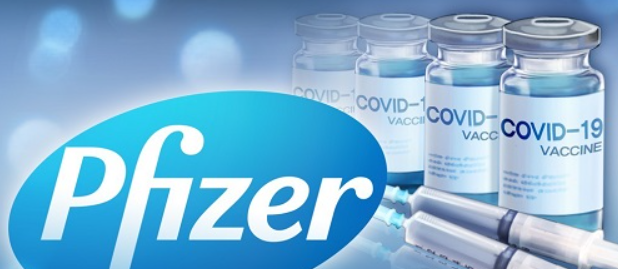
A global pharmaceutical company's stock is being shaken as obesity treatments gain popularity and face shortages in the United States. American pharmaceutical company Eli Lilly (LLY), known for its diabetes treatments, and Denmark's Novo Nordisk (NVO), listed on the Danish stock exchange, are fiercely competing in the obesity treatment market. Meanwhile, Pfizer (PFE), known for its COVID-19 vaccine, is also accelerating the development of a weight-loss pill. Pfizer's stock has been declining since last year, and the development of a diet pill is attracting market attention.
Pfizer's stock has dropped by 23% this year. Compared to its peak of $58 in December 2021, the current stock price of $38 reflects a 34% decline. Pfizer's market capitalization is around $218 billion (approximately 28.2 trillion won), making it the eighth largest in the global pharmaceutical industry and the fifth largest in the United States, following Eli Lilly, Johnson & Johnson, Merck, and AbbVie.
In the search for future prospects, Pfizer announced the phase 2 clinical trial results of its oral diabetes treatment "Danuglipron" for obesity at the end of last month. Pfizer's obesity treatment stands out as it comes in the form of a pill, whereas most obesity treatments are administered via injections. According to the Journal of the American Medical Association, the phase 2 trial involved 411 adult patients with type 2 diabetes who took a high dose (120mg) of the pill twice a day for 16 weeks, resulting in an average weight loss of approximately 4.5kg.
On the day the clinical results were announced, Pfizer's stock rose by 5.4% in a single day and is currently trading in the $38 range. Investors are closely following the situation as the obesity treatment market is rapidly growing. According to Morgan Stanley, the obesity treatment market, which was worth $2.4 billion (approximately 3 trillion won) last year, is expected to reach $54 billion (approximately 70 trillion won) by 2030. Hollywood stars, social media influencers, and even billionaires like Elon Musk, CEO of Tesla, have been known to use obesity treatments to lose weight, further contributing to the scarcity phenomenon.
Particularly for Pfizer, which has recently struggled with its performance, there is even more interest. In the first quarter of this year, Pfizer reported sales of $18.2 billion and earnings per share (EPS) of $1.23. Sales decreased by 29% compared to the previous year, and profits decreased by 24%. According to TipRanks, Wall Street analysts set a 12-month target price of $46 for Pfizer's stock, with only 5 out of 15 analysts giving a "buy" rating.
The two products that make up the largest proportion of Pfizer's sales are both related to COVID-19. The oral antiviral therapy Paxlovid accounts for 22.3% (as of the first quarter), and the COVID-19 vaccine Comirnaty accounts for 16.8% of sales. Pfizer expects a decrease in sales for both products this year.
In a hurry to find new sources of revenue, Pfizer acquired the antibody-drug conjugate (ADC) company Cogen in March. The acquisition is expected to be completed by the end of this year, with a total value of $43 billion (approximately 55 trillion won). Analyst Oh Ee-rim from Korea Investment & Securities said, "Pfizer's ADC pipeline, secured through this acquisition, is expected to generate $10 billion (approximately 13 trillion won) in revenue by 2030, contributing significantly to the increase in future enterprise value."
At the center of the obesity treatment market are Novo Nordisk's "Saxenda" and Eli Lilly's "Larzine". Both are weekly injectable drugs. These two global pharmaceutical companies are already fiercely competing for the top spot in the diabetes market.
Novo Nordisk is leading the way in obesity treatment development. The company received approval for "Saxenda," which reduces the frequency of injections from daily to once a week while still providing effective results. According to clinical results, Saxenda led to an average weight loss of 15kg over 68 weeks.
This company's diabetes treatment, "Ozempic," is also used for weight loss. Eli Lilly is also closely following. In the phase 3 clinical trial results announced last month, "Larzine" led to a maximum weight loss of 15.7% in participants.
Eli Lilly, the "industry leader," has seen a 21% increase in its stock price this year alone. It also experienced a 36% increase during the market downturn last year. Novo Nordisk, the "largest market capitalization in Denmark," saw a 15% increase in its American Depository Receipts (ADR) this year and a 26% increase over the past year. Both companies are known for their solid performance in their core business, in addition to various positive factors.
The stock prices of global pharmaceutical companies face the risk of the US government limiting drug prices through the Inflation Reduction Act (IRA). However, pharmaceutical consumption cannot be reduced even during an economic downturn, so pharmaceutical companies are considered defensive stocks.
In the first quarter, Eli Lilly's highest-weighted drug in terms of sales is the once-weekly injectable diabetes drug "Trulicity," accounting for 28.4% of total sales. The obesity treatment "Larzine" accounts for 8.2% of total sales. In addition to diabetes treatments, Eli Lilly also possesses various drugs, including cancer drugs such as Verzenio, Taltz, and Retevmo. On the other hand, Novo Nordisk relies heavily on diabetes and obesity treatments, which account for 91.4% of its sales. It currently takes responsibility for supplying over 50% of the world's insulin.
댓글